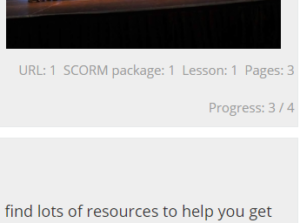The Story
In 2014, it had been 4 years since I left the teaching profession with the local school board and I had grown weary of developing courses for others at my job as an instructional designer. Things were getting stale! I had to do something that was not only challenging but also rewarding intrinsically and extrinsically. I always liked to learn and loved to learn about learning which is why I became a teacher in the first place. I decided to search programs that would not only interest me but fit into my current and future career aspirations; to eventually get back into the traditional classroom while still creating great online courses.
The answer was to enroll into an MAEd program to brush up on my teaching skills and knowledge of adult learning principles. What was crazy was that I was also interested in getting my TESL Certification with the hope of going back into the classroom more quickly. For the first year and a half, I was married with no children. In my first semester, I had to travel to two universities once a week. My classes began at 4:30 and ended at 7: 00 pm. Both were loaded with lots of work. My master’s course required intensive readings, presentations, and a paper.
I was able to study all week while I still had to time binge-watch Netflix shows with my wife. On other days, I would head out to play soccer and teach Greek dance. I was even able to watch mini Star Wars marathons. Then in the spring of 2015, we received wonderful news; a baby was coming in January 2016! This news broke at a time when I was taking two master’s courses per semester. My wife and I discussed how I could juggle these responsibilities before we planned to have children and we thought that it wasn’t going to be a problem. We would just endure.
When my first-born came to this world, I was able to finish most of my course work because of the strict scheduling. It wasn’t easy. I remember taking a qualitative research methods course that winter which also required lots of reading and assignments. It was very challenging. I remember sitting in the living room with my earphones on trying to transcribe an interview that I recorded with a fellow student. The assignment was rigorous and the transcription had to be more than just precise. I remember listening to the interview with the faint noise of “waaaah, waaaah” in the background. I looked over, and I saw my wife – a “mombie” (zombie mommy) – looking at me while she was trying to console my daughter. It took me days to get it done while others in the class boasted a “laborious” 8 hours.
Fast forward now to 2018 and I now have two beautiful children (a 2.5 year old and a 6 month old) and a master’s thesis that has been extended for two years. What happened? Delays, no time, sleep deprivation, no energy, and a head space filled with a million things that need to be done (day care pick up, feed the kids, negotiate with the kids, play with the kids, stay up with the kids, put kids to bed etc…). I admit that I do not regret one single minute as my kids have given me the best joy in the world however, writing a thesis at 11:30 pm on a weeknight is daunting. I also do not regret pursuing my master’s while having two children. I have learned a lot and I have grown as a person since then.
So, how does someone with a family continue their education? I compiled a few key things that I hope will prepare people like myself to endure schoolwork and diapers.
The Survival Guide
#1: There is No Perfect Time to Start
 This is no secret. We live in a neo-liberal world where financialization reigns supreme. Global markets have meshed together thus creating extensive reliance on one another’s economic performance. Just as the U.S. had their economic meltdown in 2008, the rest of the world felt it almost immediately. This has caused firms like Lehman Brothers to either shut down or “restructure.”
This is no secret. We live in a neo-liberal world where financialization reigns supreme. Global markets have meshed together thus creating extensive reliance on one another’s economic performance. Just as the U.S. had their economic meltdown in 2008, the rest of the world felt it almost immediately. This has caused firms like Lehman Brothers to either shut down or “restructure.”
Becoming (and staying employed) can be hard. If you want to stay ahead of the game, learning additional skills and knowledge is an investment for career advancement. Even when you are family planning, do not let that get in the way to upgrade your education. As long as you plan financially (see #7) and garner support (see# 5), anything is possible.
# 2: Choose Flexibility (if available)
 If life and work are too hectic, consider upgrading your education by taking online courses. Asynchronous (self-paced) courses are very flexible for individuals who do not have the time to commit to a strict time. I have developed these courses for almost a decade, and the experiences range from the LMS giving you “cookie cutter” automated feedback/grading or a more personal touch with an instructor present. Look at the kinds of courses, programs, and certifications that you would like to take and shop around the various institutions who offer them online.
If life and work are too hectic, consider upgrading your education by taking online courses. Asynchronous (self-paced) courses are very flexible for individuals who do not have the time to commit to a strict time. I have developed these courses for almost a decade, and the experiences range from the LMS giving you “cookie cutter” automated feedback/grading or a more personal touch with an instructor present. Look at the kinds of courses, programs, and certifications that you would like to take and shop around the various institutions who offer them online.
Be warned: Learning online is not exactly the same as an in-class course (nor is it easier). The instructor presence in an online course may not be the same as going to class because of the lack of “face-to-face” time (but it can still be a rich learning experience). Certification-based courses sometimes have no instructors at all as the only feedback that you might get is from a quiz that says “Correct!” or “You selected the incorrect answer” (and unfortunately, that’s it). Finally, self-paced courses require you to become more independent as a learner because you will need to be (REALLY) good at your time management skills (see #3). Try to engage with the course every week so that you do not fall behind, miss new information, or forget an assignment.
#3 Time Manage EXTRA Carefully and Set Goals
 Time management is a crucial tool for anyone to become successful. It does get harder when you are having children but it is not impossible. Grab and old fashioned calendar (or an app) and lay out your weekly schedule. Family and work is obviously your number one priority, so find those sweet “down time” slots where you can fit some of your schoolwork. If you “space-out” your study times, you have a higher chance of learning the material rather than not (avoid cramming).
Time management is a crucial tool for anyone to become successful. It does get harder when you are having children but it is not impossible. Grab and old fashioned calendar (or an app) and lay out your weekly schedule. Family and work is obviously your number one priority, so find those sweet “down time” slots where you can fit some of your schoolwork. If you “space-out” your study times, you have a higher chance of learning the material rather than not (avoid cramming).
Set weekly realistic/specific goals such as “Read the two articles for class “x” by Friday evening” or “write five pages for thesis by Sunday night.” This will help you stay on track. Avoid using non-specific immeasurable goals such as “do some reading” or “write my essay.” Watch the video below to learn about SMART Goals.
#4 Expect Delays
 Parenthood has MANY unexpected surprises. Everything from your child’s sleep regression, growth spurts, illness, appointments, and emergencies can throw your time off. Let’s not forget that you are also human and that exhaustion is part of the package for becoming a parent. If you are writing a thesis, dissertation, or essay, give yourself enough time to write and start early. Don’t get upset if you are two weeks or two months behind. As long as you have the support from your instructor/supervisor (see #5) and the timelines are flexible, you can only do what you can do. If you are writing assignments with due dates, again start early! Also take note that your instructor/supervisor is also human and has a life. They may not be able to get things to you in the time that you expect. Be patient.
Parenthood has MANY unexpected surprises. Everything from your child’s sleep regression, growth spurts, illness, appointments, and emergencies can throw your time off. Let’s not forget that you are also human and that exhaustion is part of the package for becoming a parent. If you are writing a thesis, dissertation, or essay, give yourself enough time to write and start early. Don’t get upset if you are two weeks or two months behind. As long as you have the support from your instructor/supervisor (see #5) and the timelines are flexible, you can only do what you can do. If you are writing assignments with due dates, again start early! Also take note that your instructor/supervisor is also human and has a life. They may not be able to get things to you in the time that you expect. Be patient.
#5 Get Support First
When planning to go back to school, ensure that you talk to your partner and family if they can help you with your commitments. You will need to devote lots of time with your studies (which means less time spent your kids). Also, talk to your instructor and supervisor about your situation. A good instructor and/or supervisor should be empathetic and understand your situation (such as mine!).
#6 Leave Your Home as Much as You Can
 Don’t be stuck at home all the time. It’s a good idea to get some work done at home as long as you are away from the little rascals. Unfortunately, this may be all too distracting with all of the meltdowns and play time. When you get the opportunity, leave your home and go to a library, cafe, or a place where you know that you can be productive. There is actual research that states that you can enhance your learning by changing your location from time to time (Carey, 2014).
Don’t be stuck at home all the time. It’s a good idea to get some work done at home as long as you are away from the little rascals. Unfortunately, this may be all too distracting with all of the meltdowns and play time. When you get the opportunity, leave your home and go to a library, cafe, or a place where you know that you can be productive. There is actual research that states that you can enhance your learning by changing your location from time to time (Carey, 2014).
#7 Plan Financially
 Going back to school can be expensive and a good strategy to use is to inquire how much a course, certification or program will cost you. Then, compare it with your financial situation. For those who don’t know, daycare in Halifax can run up to $800 a month per child. Diapers can go to $40-80 a month. Factor in groceries, home/car insurance, rent, mortgage, trips, maternity leave and all of that fun stuff. If you can only take a course a semester, then that is perfectly fine as that it worked for me. This isn’t a race! Take your time and do what you can afford or have time to do.
Going back to school can be expensive and a good strategy to use is to inquire how much a course, certification or program will cost you. Then, compare it with your financial situation. For those who don’t know, daycare in Halifax can run up to $800 a month per child. Diapers can go to $40-80 a month. Factor in groceries, home/car insurance, rent, mortgage, trips, maternity leave and all of that fun stuff. If you can only take a course a semester, then that is perfectly fine as that it worked for me. This isn’t a race! Take your time and do what you can afford or have time to do.
#8 Push Yourself!
When things get tough, have grit! There will be times where you will be sitting on the couch staring at your laptop or books and you will be drawing blanks. That’s ok because it is not your fault that your little “mini me” was up late the night before (and perky early that morning). However, this will happen from time to time, so it is best that you roll up those sleeves, drink that nice hot coffee, and bang that paragraph out that has plagued you for the last two hours.
#9 Study Smarter
This is an entire course on its own (which I will post at a later time). There are tons of great learning strategies to use while studying. In order to keep this short, I provided some “high impact” strategies below:
- Self-Test Yourself: If you are reading chapters from a book, turn the headings into questions. For example, if the heading is titled “Cells,” then convert it to “What is a cell?” or “What are cells made up of?” Do the same thing when it reading supplemental materials (articles, websites, documents). Sometimes, online courses are not designed great either (I have seen many!). Don’t just click “Next;” Take notes and self-test yourself before attempting the quiz.
- Dual Coding: Dual coding is the process of turning words into images for the purpose to retain and to extend (such as explaining how something works). This strategy can be used to enhance memory retention and studies have shown that it is effective. You do not have to be an artist to do this!
- Create a Mind Map or a Concept Map: Both of these are visual strategies (like dual coding) but more extensive. These strategies can help you organize a chapter into a hierarchical structure. For example, if you are reading a very dense chapter, you can create a mind map/concept map to see the overall relationship (or connections) of the overall themes that you have read. See the videos below on how to create them:
- The Pen is Mightier than the Keyboard: Research has shown that handwritten notes are better for memory retention than typing. Why? When you type, you are using surface-level brain processing power while writing allows you to tap into a deeper cognitive processing mode (Mueller & Oppenheimer, 2014).
- Proper Note-taking: Whether you are in class, reading a book (or an online page), or watching a video, take notes. There are proper ways to write them. The Cornell Notes System is a great tool. The key of this strategy is to find all the main ideas and then to summarize the information at the bottom. Please note: Memorizing and underlining text are not effective! The key to retain what you are trying to learn is best when you re-write your notes by summarizing them. Underlining can help you identify the main ideas of a paragraph, but you must re-write it. Click the link below to learn more about summarizing your notes and the Cornell Note-taking System:
Cornell Notes
Summarizing: http://www.uefap.com/reading/notetake/summary.htm
- Read Aloud or Use Text-to-Speech: Reading your paper aloud can help you identify any errors that you may have missed. If something that you are reading doesn’t sound right, it probably isn’t. Also, Microsoft Word has many functions that will allow you to identify errors such as spelling and grammar, but they are not perfect. Traditionally, many use text-to-speech as an accessibility tool for those who are visually impaired, but there is also another way to use it. If you try the text-speech function, Word will read out your paper for you and you will be able to hear any errors that you (and Word) missed.
#10 Expect Setbacks
Despite that you can plan study times, set goals of how many paragraphs to write by the end of the week, or believing that you wrote the most amazing chapter of all time, expect things to turn on their own heads. You may not have been able to put in the study time that you planned for the week and you may have been stuck researching more than writing. Your supervisor may return an entire section of your paper with that one dreaded comment; “Remove.” Don’t panic. It’s all about the process! Continue week after week to plan what you want to accomplish. Also, ensure that you “park” text that was identified to be deleted. Start new versions of your paper and don’t overwrite anything. It may come in handy later on.
References:
Brown, P. C., Roediger, H. L., & McDaniel, M. A. (2014). Make it stick: The science of successful learning. Cambridge, Massachusetts: The Belknap Press of Harvard University Press.
Carey, B. (2014). How we learn: The surprising truth about when, where, and why it happens. New York, NY: Random House.
Mueller, P. A., & Oppenheimer, D. M. (2014). The pen is mightier than the keyboard: Advantages of longhand over laptop note taking. Psychological Science, 25(6), 1159–1168.
Using English for Academic Purposes for Students in Higher Education. Summarizing and Note-taking. Retrieved from: http://www.uefap.com/reading/notetake/summary.htm
